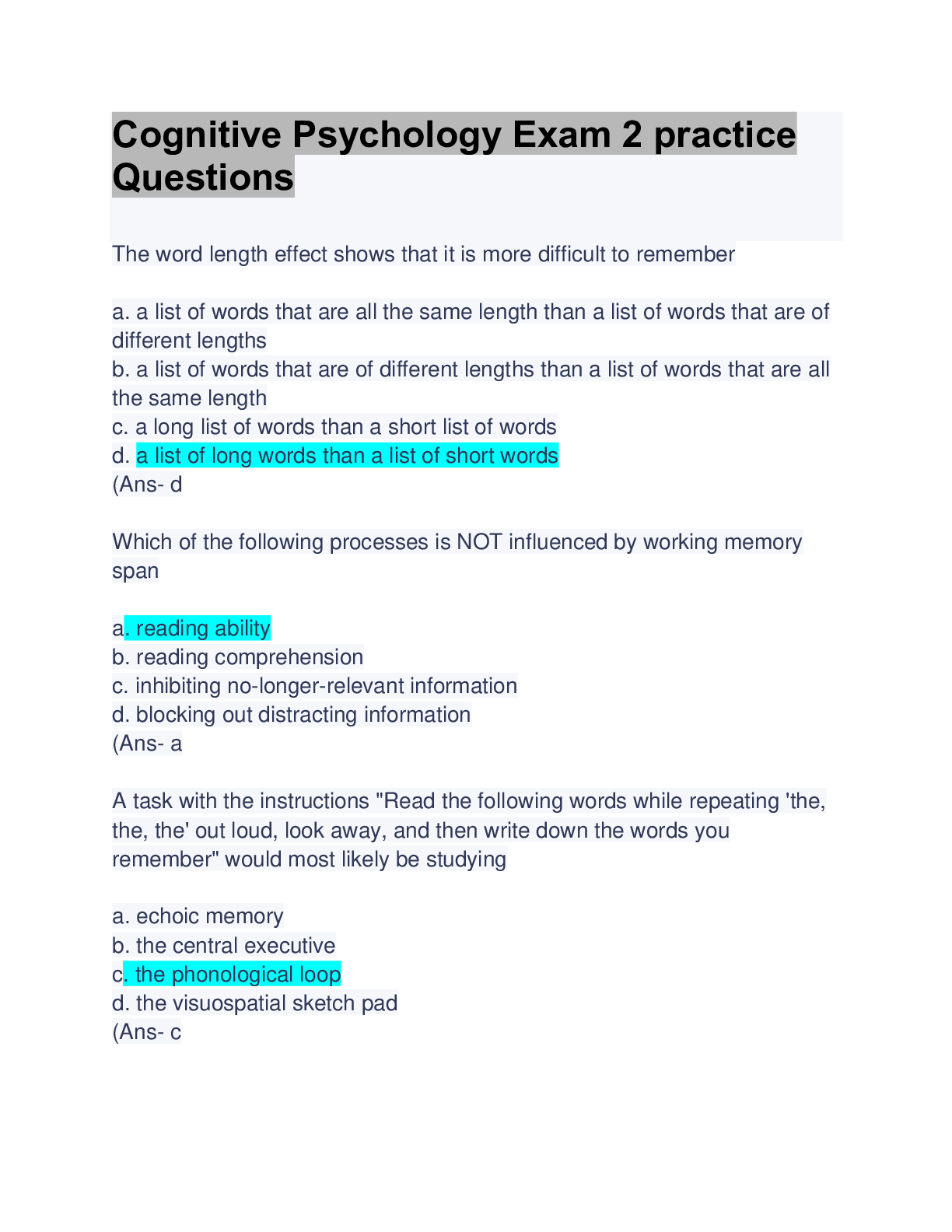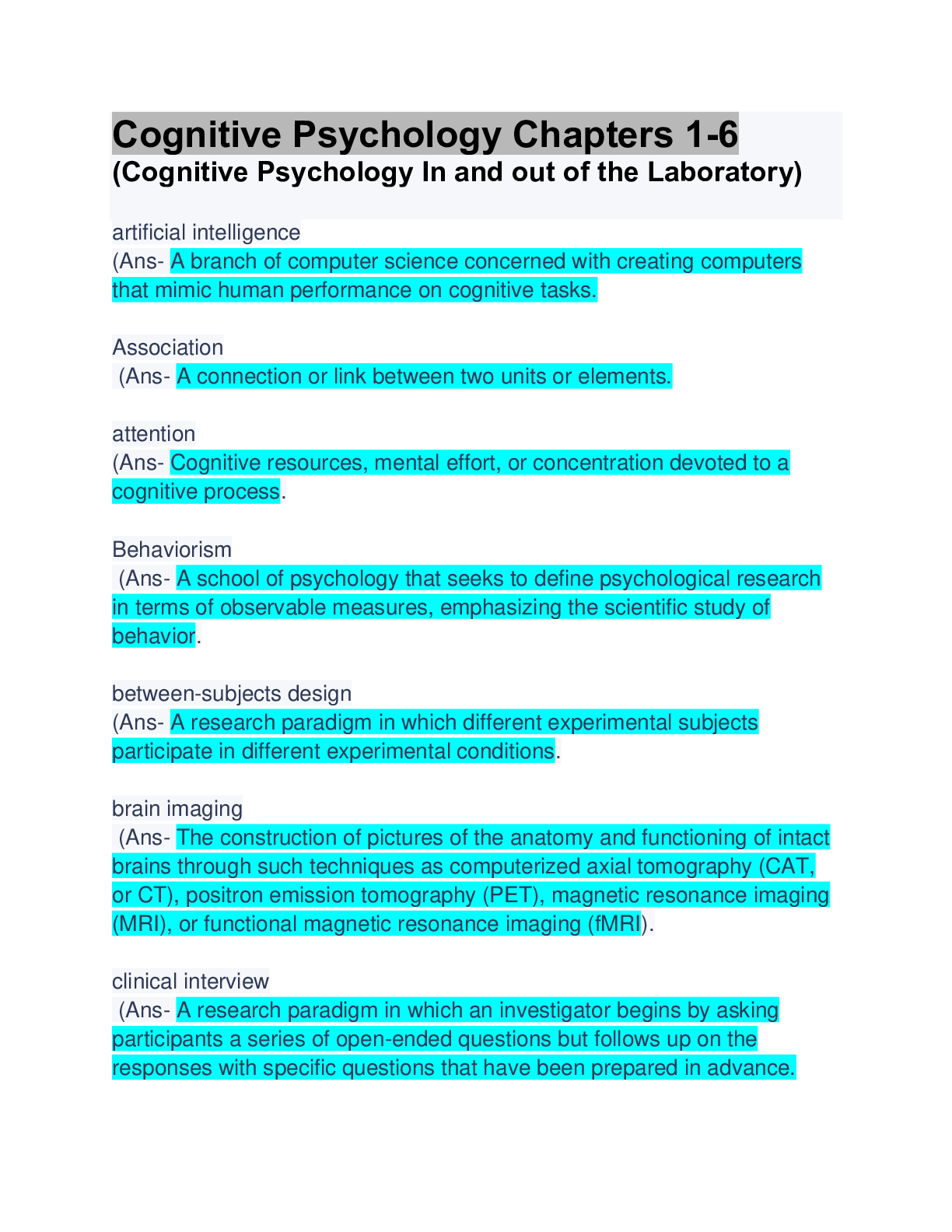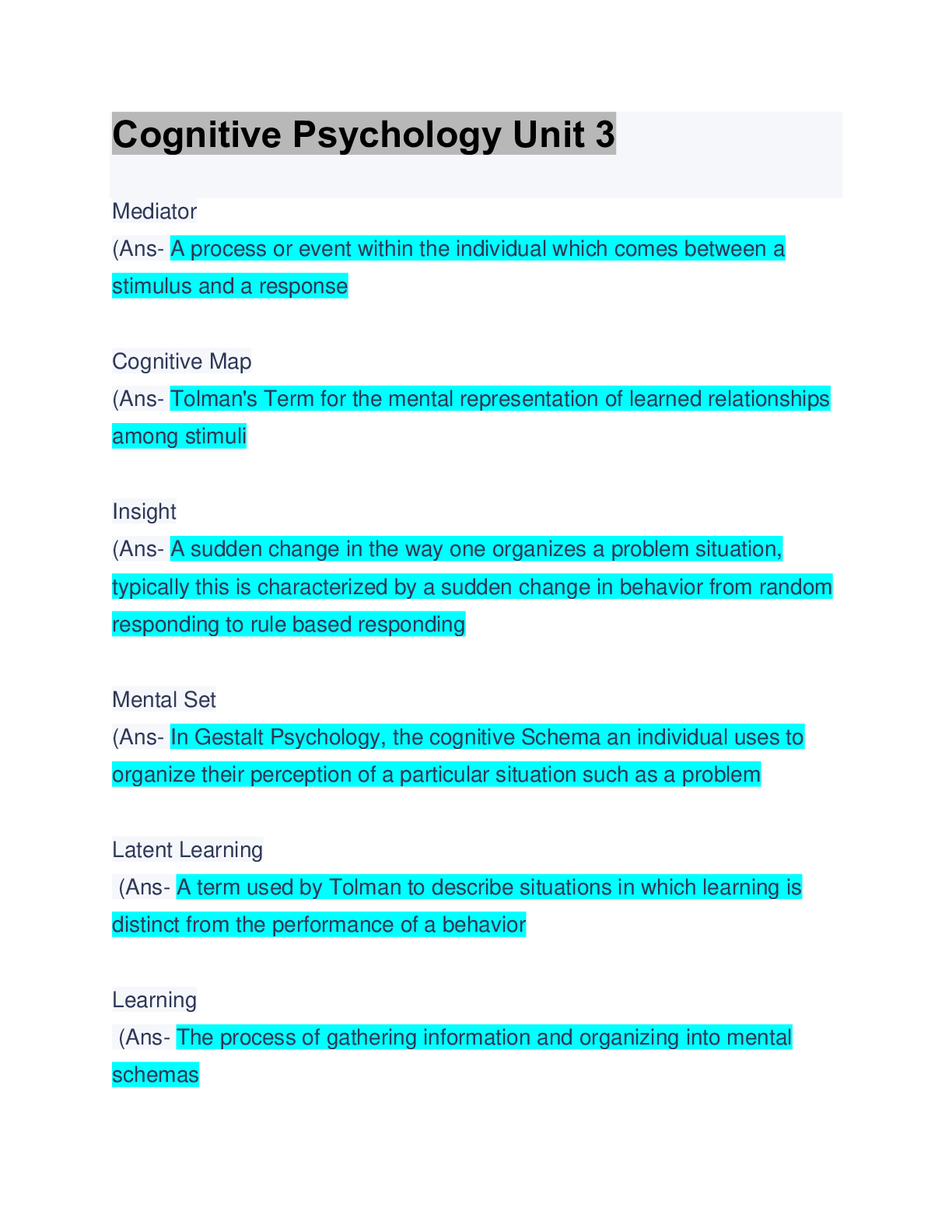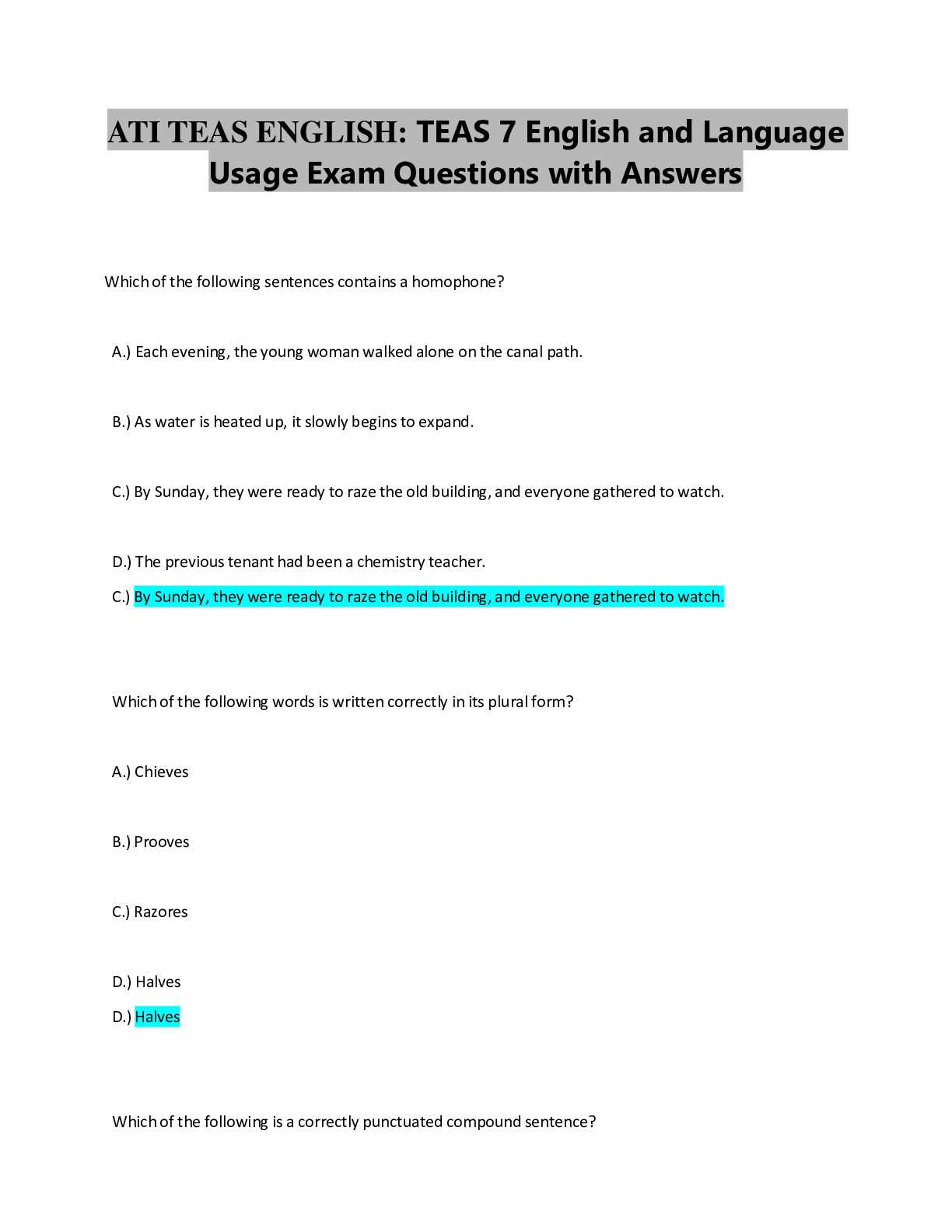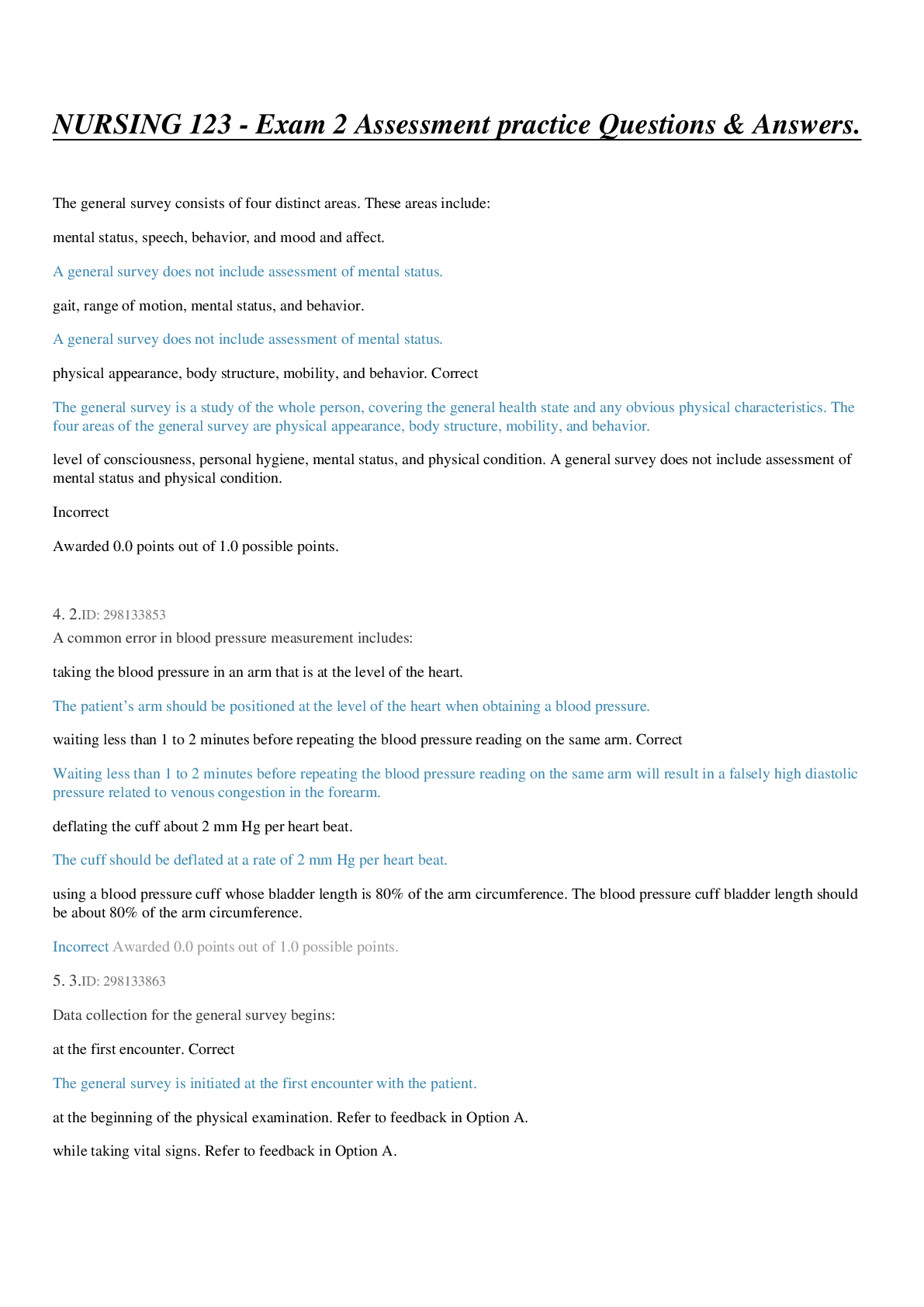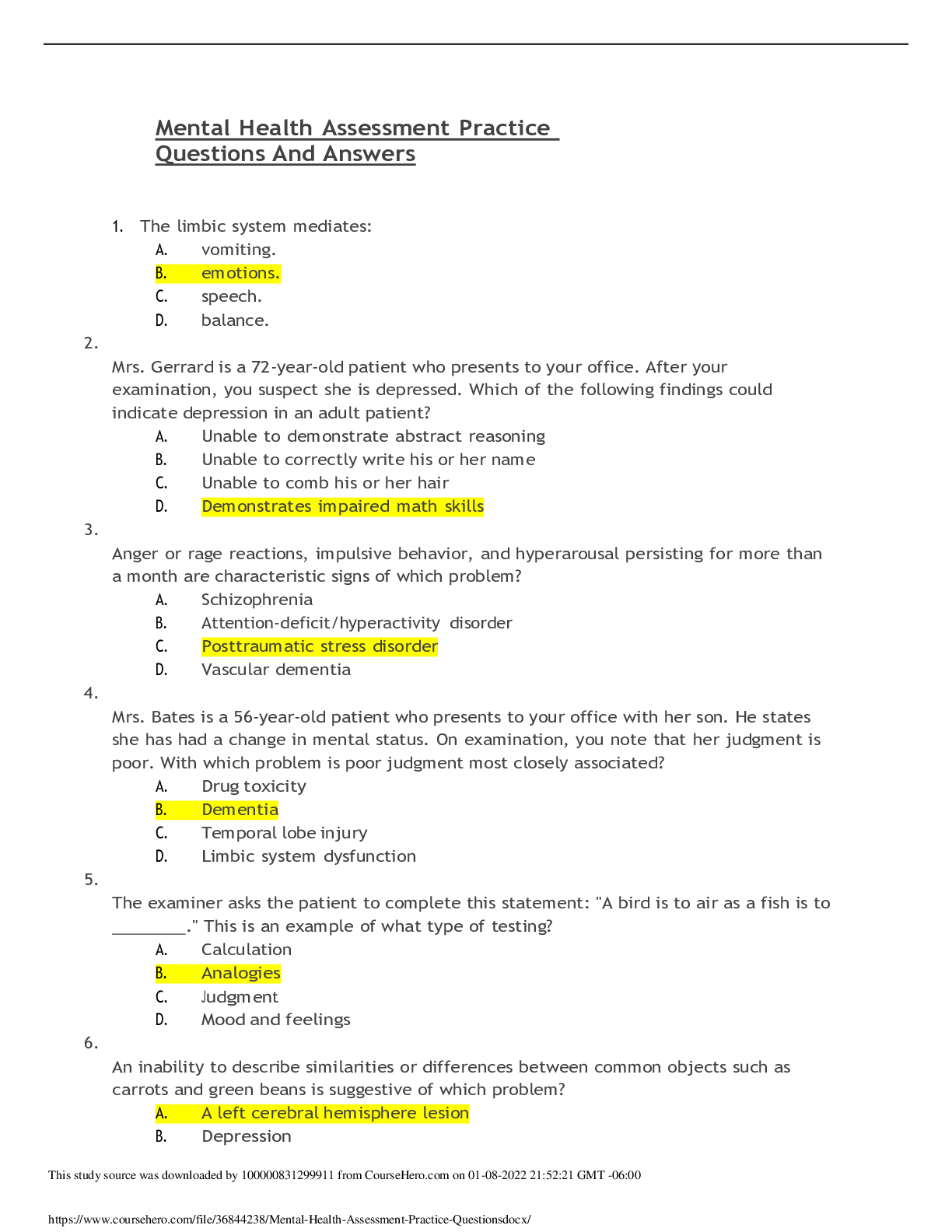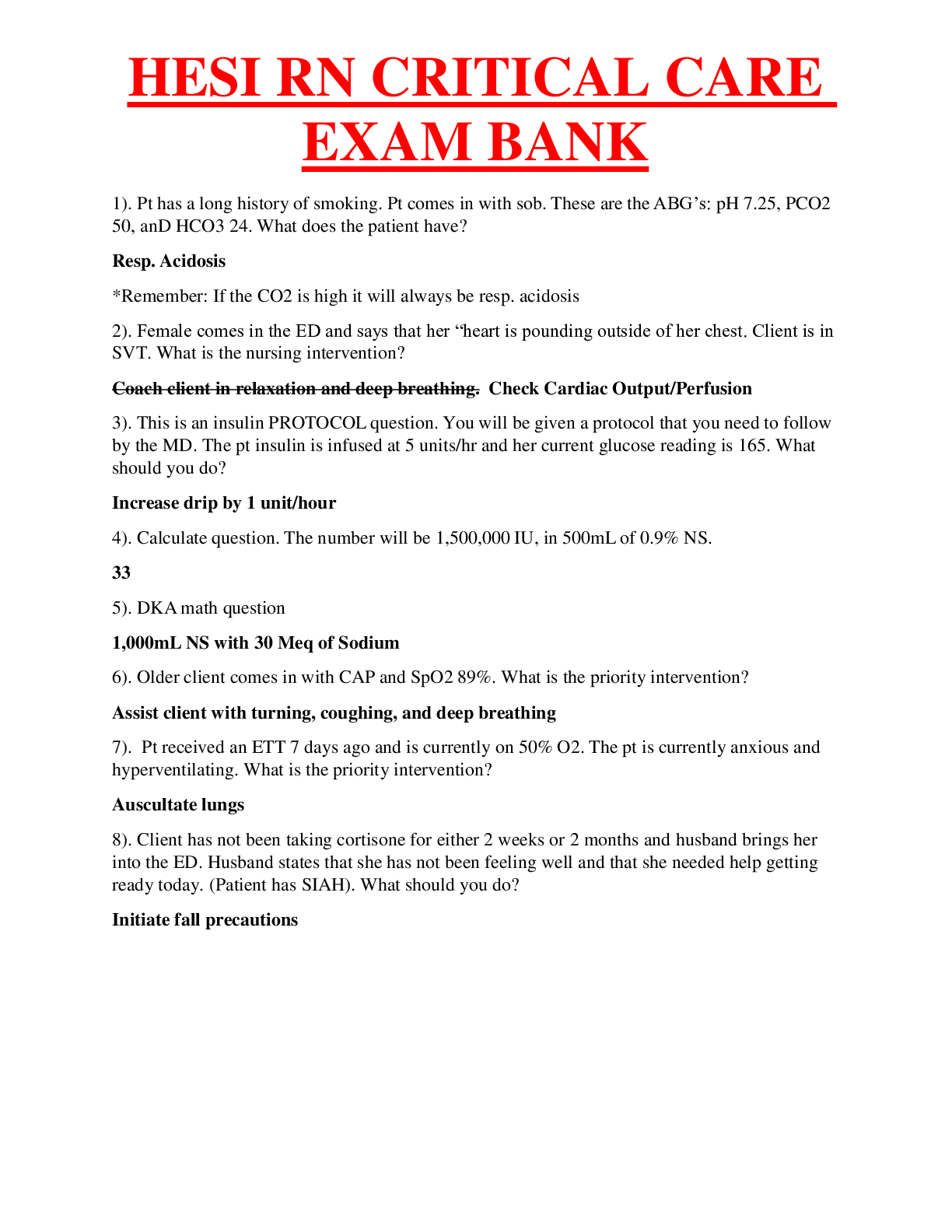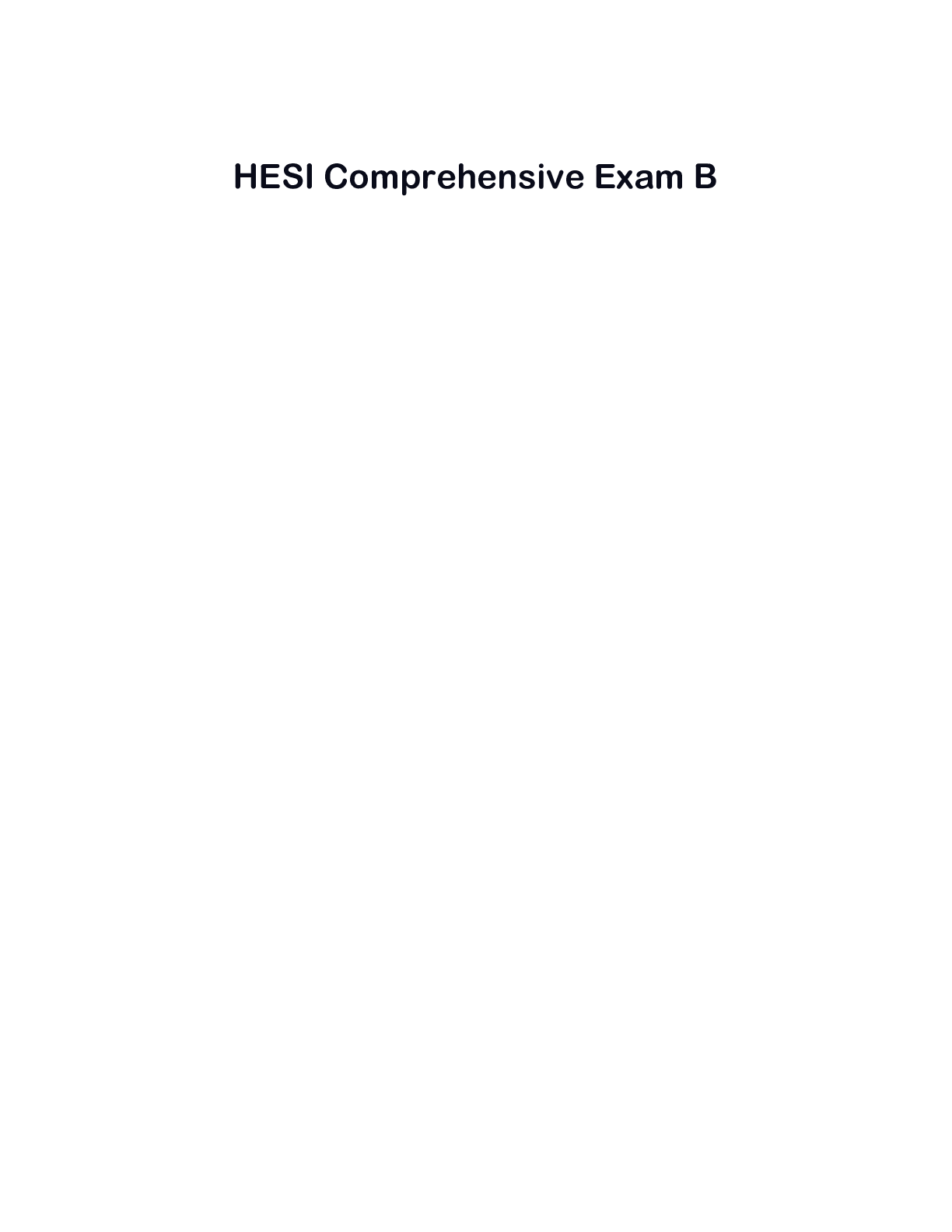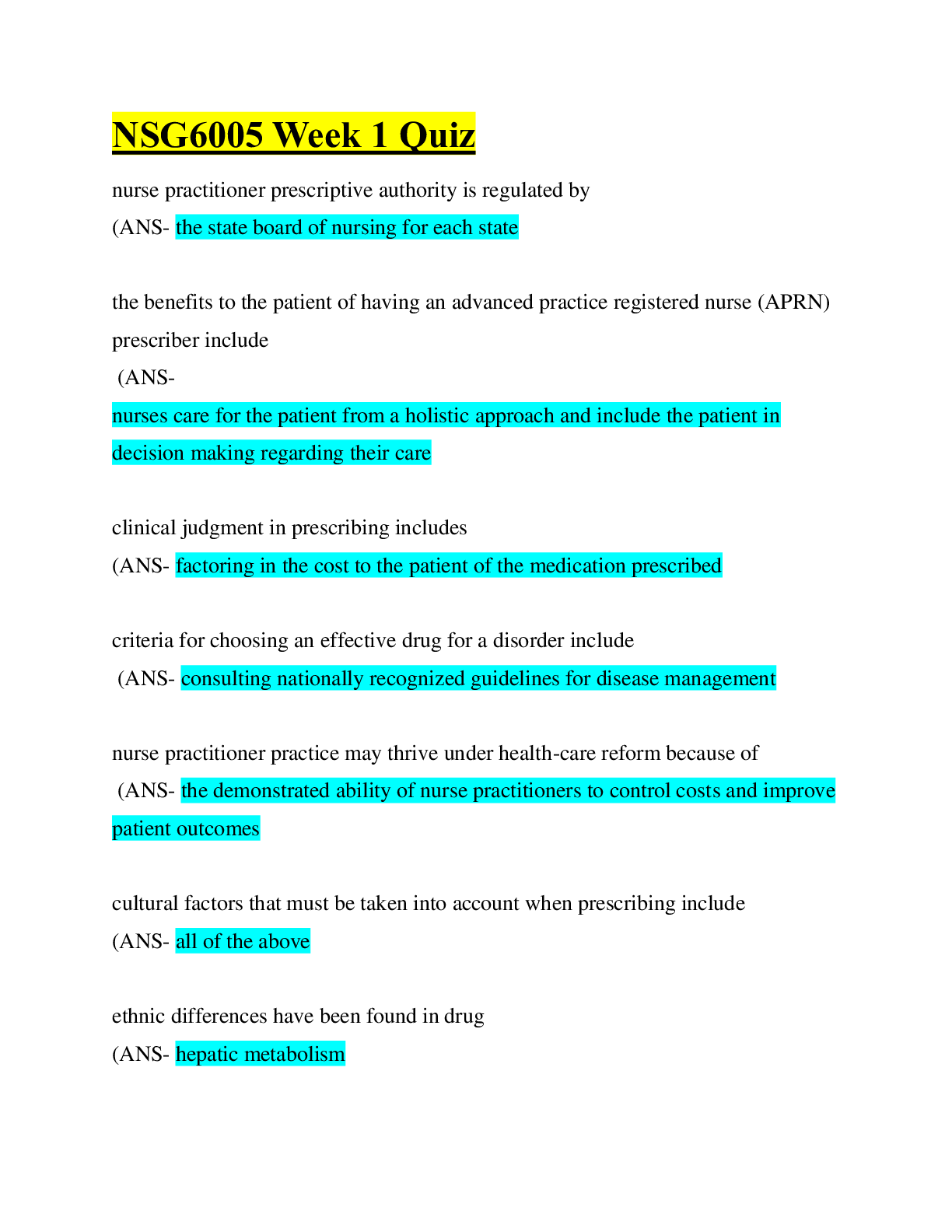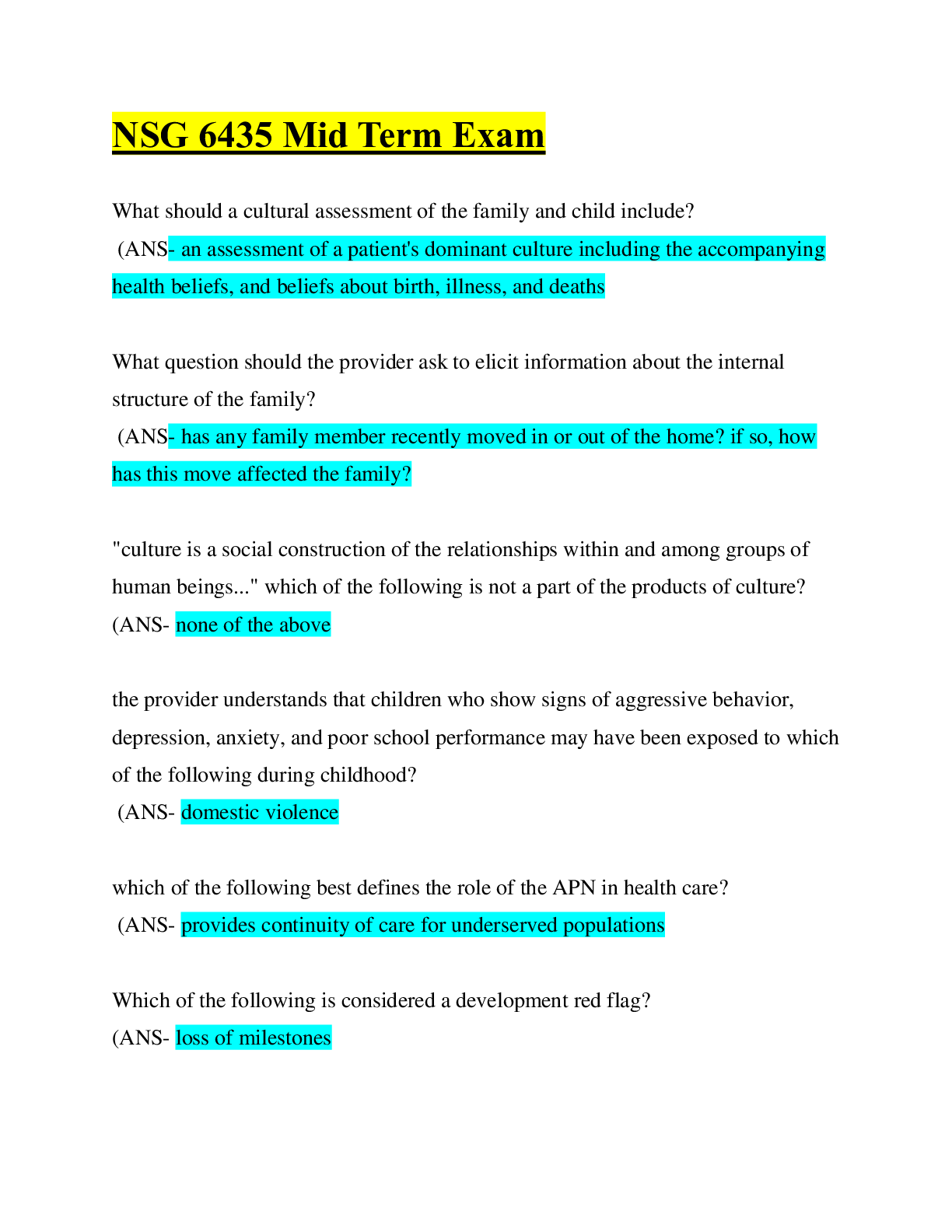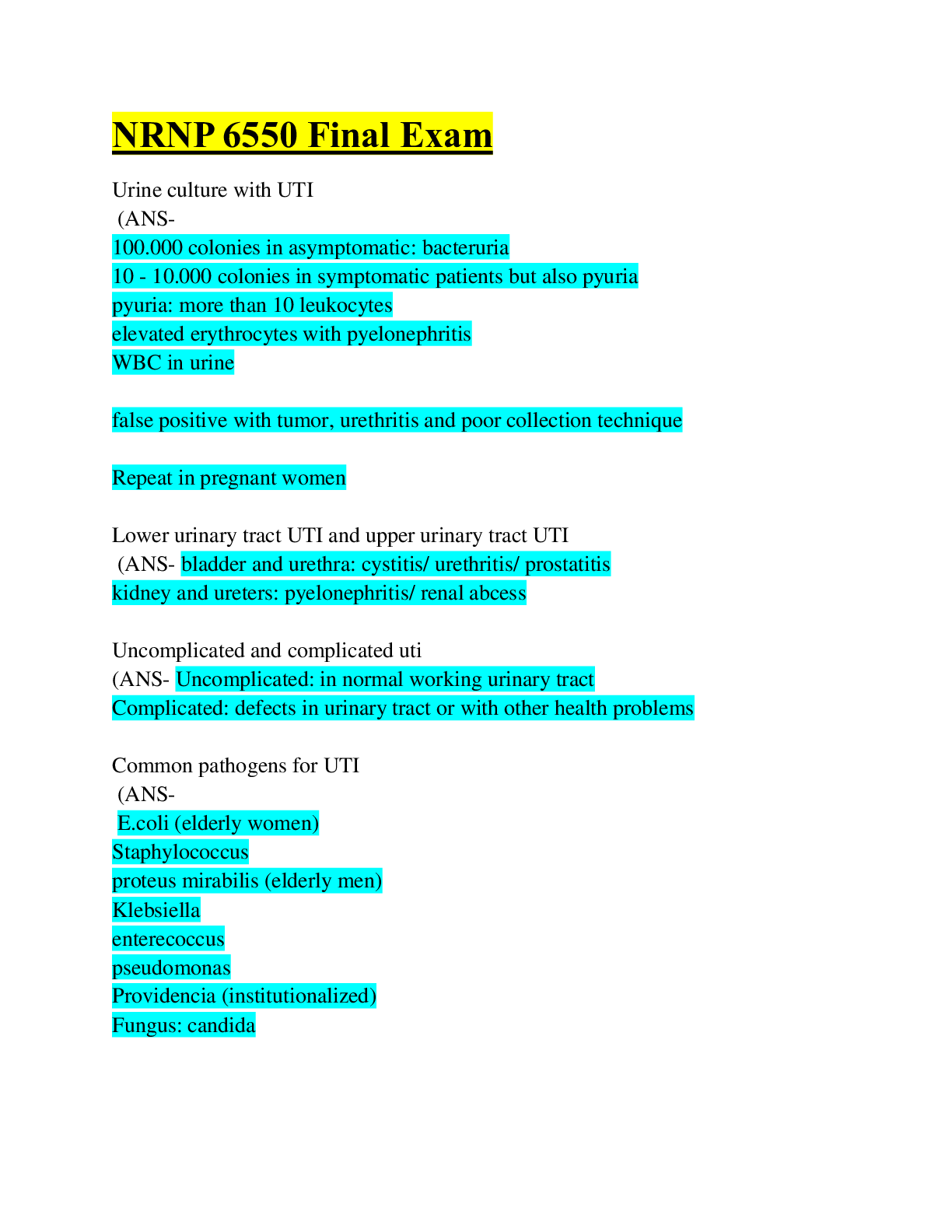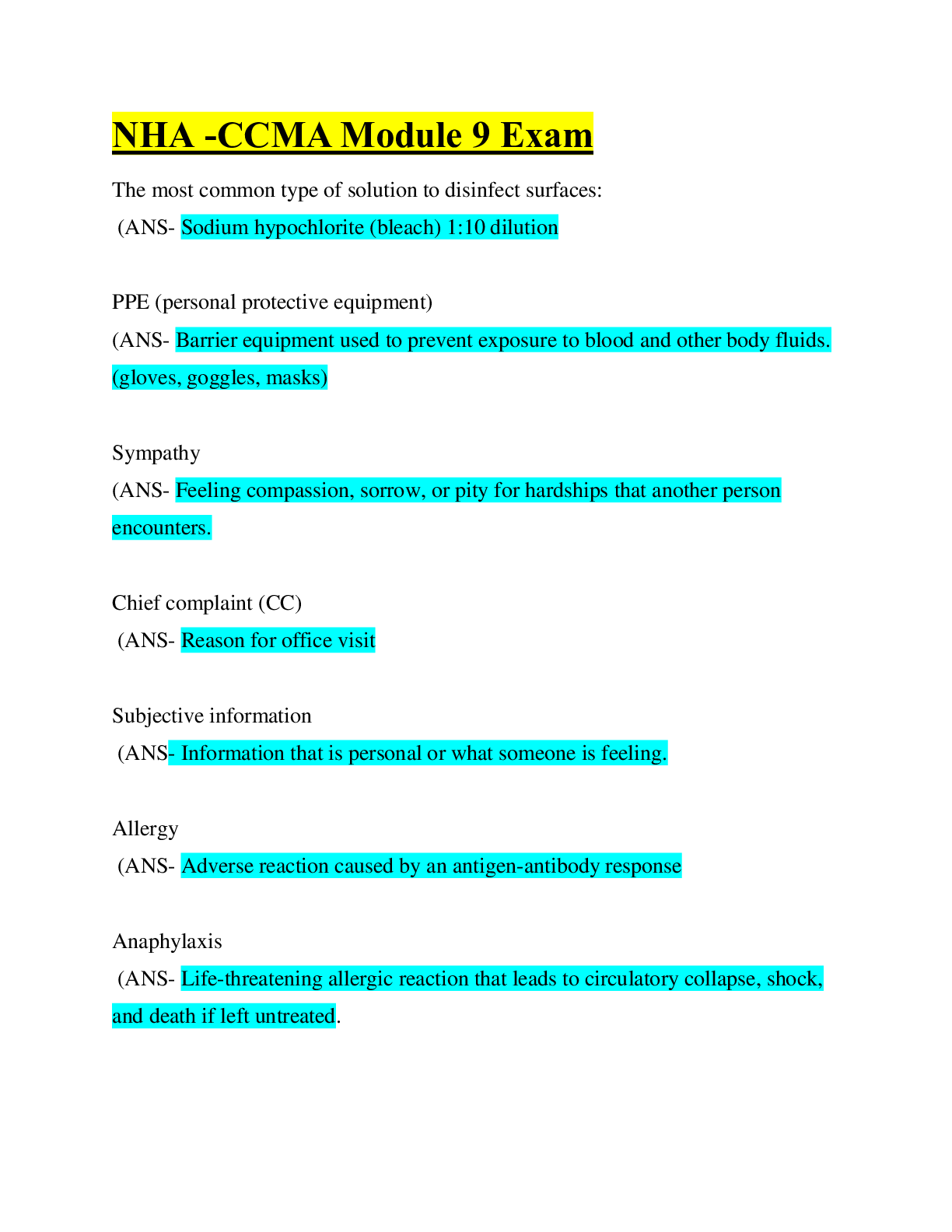Health Care > EXAM > HESI Health Assessment Practice Questions & Answers/ Latest Updated. (All)
HESI Health Assessment Practice Questions & Answers/ Latest Updated.
Document Content and Description Below
. In an interview, the nurse may find it necessary to take notes to aid his or her memory later. Which statement is true regarding note-taking? A) Note-taking may impede the nurse's observation of... the patient's nonverbal behaviors. B) Note-taking allows the patient to continue at his or her own pace as the nurse records what is said. C) Note-taking allows the nurse to shift attention away from the patient, resulting in an increased comfort level. D) Note-taking allows the nurse to break eye contact with the patient, which may increase his or her level of comfort. (ANS- A) Note-taking may impede the nurse's observation of the patient's nonverbal behaviors. 2. During an interview, the nurse states, "You mentioned shortness of breath. Tell me more about that." Which verbal skill is used with this statement? A) Reflection B) Facilitation C) Direct question D) Open-ended question (ANS- D) Open-ended question 3. A nurse is taking complete health histories on all of the patients attending a wellness workshop. On the history form, one of the written questions asks, "You don't smoke, drink, or take drugs, do you?" This question is an example of: A) talking too much. B) using confrontation. C) using biased or leading questions. D) using blunt language to deal with distasteful topics. (ANS- C) using biased or leading questions. 4. During an interview, a parent of a hospitalized child is sitting in an open position. As the interviewer begins to discuss his son's treatment, however, he suddenly crosses his arms against his chest and crosses his legs. This would suggest that the parent is: A) just changing positions. B) more comfortable in this position. C) tired and needs a break from the interview. D) uncomfortable talking about his son's treatment. (ANS- D) uncomfortable talking about his son's treatment. 5. The nurse is interviewing a patient who has a hearing impairment. What techniques would be most beneficial in communicating with this patient? A) Determine the communication method he prefers. B) Avoid using facial and hand gestures because most hearing-impaired people find this degrading. C) Request a sign language interpreter before meeting with him to help facilitate the communication. D) Speak loudly and with exaggerated facial movement when talking with him because this helps with lip reading. (ANS- A) Determine the communication method he prefers. 6. The nurse is performing a health interview on a patient who has a language barrier, and no interpreter is available. Which is the best example of an appropriate question for the nurse to ask in this situation? A) "Do you take medicine?" B) "Do you sterilize the bottles?" C) "Do you have nausea and vomiting?" D) "You have been taking your medicine, haven't you?" (ANS- A) "Do you take medicine?" 7. A female patient does not speak English well, and the nurse needs to choose an interpreter. Which of the following would be the most appropriate choice? A) A trained interpreter B) A male family member C) A female family member D) A volunteer college student from the foreign language studies department (ANS- A) A trained interpreter 8. The nurse is conducting an interview. Which of these statements is true regarding open-ended questions? Select all that apply. A) They elicit cold facts. B) They allow for self-expression. C) They build and enhance rapport. D) They leave interactions neutral. E) They call for short one- to two-word answers. F) They are used when narrative information is needed. (ANS- B) They allow for self-expression. C) They build and enhance rapport. F) They are used when narrative information 9. The nurse is conducting an interview in an outpatient clinic and is using a computer to record data. Which is the best use of the computer in this situation? Select all that apply. A) Collect the patient's data in a direct, face-to-face manner. B) Enter all the data as the patient states it. C) Ask the patient to wait as the nurse enters data. D) Type the data into the computer after the narrative is fully explored. E) Allow the patient to see the monitor during typing. (ANS- A) Collect the patient's data in a direct, face-to-face manner. D) Type the data into the computer after the narrative is fully explored. E) Allow the patient to see the monitor during typing. 10. During an assessment, the nurse notices that a patient is handling a small charm that is tied to a leather strip around his neck. Which action by the nurse is appropriate? A) Ask the patient about the item and its significance. B) Ask the patient to lock the item with other valuables in the hospital's safe. C) Tell the patient that a family member should take valuables home. D) No action is necessary. (ANS- A) Ask the patient about the item and its significance. 11. In the majority culture of America, coughing, sweating, and diarrhea are symptoms of an illness. For some individuals of Mexican-American origin, however, these symptoms are a normal part of living. The nurse recognizes that this is true, probably because Mexican-Americans: A) have less efficient immune systems and are often ill. B) consider these symptoms a part of normal living, not symptoms of ill health. C) come from Mexico and coughing is normal and healthy there. D) are usually in a lower socioeconomic group and are more likely to be sick. (ANS- B) consider these symptoms a part of normal living, not symptoms of ill health. 12. Among many Asians there is a belief in the yin/yang theory, rooted in the ancient Chinese philosophy of Tao. The nurse recognizes which statement that most accurately reflects "health" in an Asian with this belief? A) A person is able to work and produce. B) A person is happy, stable, and feels good. C) All aspects of the person are in perfect balance. D) A person is able to care for others and function socially. (ANS- C) All aspects of the person are in perfect balance. 13. An individual who takes the magicoreligious perspective of illness and disease is likely to believe that his or her illness was caused by: A) germs and viruses. B) supernatural forces. C) eating imbalanced foods. D) an imbalance within his or her spiritual nature. (ANS- B) supernatural forces. 14. If an American Indian has come to the clinic to seek help with regulating her diabetes, the nurse can expect that she: A) will comply with the treatment prescribed. B) has obviously given up her beliefs in naturalistic causes of disease. C) may also be seeking the assistance of a shaman or medicine man. D) will need extra help in dealing with her illness and may be experiencing a crisis of faith. (ANS- C) may also be seeking the assistance of a shaman or medicine man. 15. An elderly Mexican-American woman with traditional beliefs has been admitted to an inpatient care unit. A culturally-sensitive nurse would: A) contact the hospital administrator about the best course of action. B) automatically get a curandero for her because it is not culturally appropriate for her to request one. C) further assess the patient's cultural beliefs and offer the patient assistance in contacting a curandero or priest if she desires. D) ask the family what they would like to do because Mexican-Americans traditionally give control of decisions to their families. (ANS- C) further assess the patient's cultural beliefs and offer the patient assistance in contacting a curandero or priest if she desires. [Show More]
Last updated: 2 years ago
Preview 1 out of 37 pages
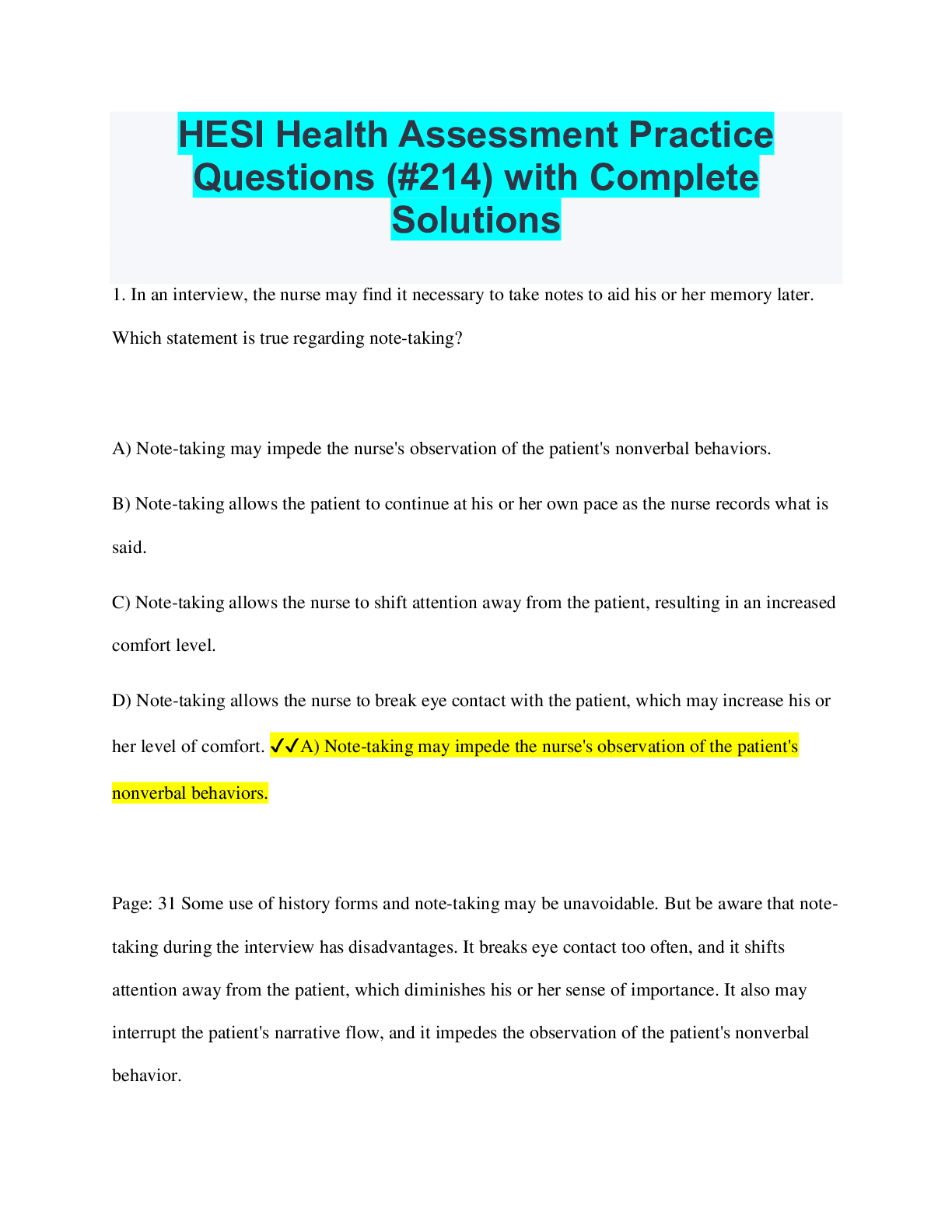
Buy this document to get the full access instantly
Instant Download Access after purchase
Buy NowInstant download
We Accept:

Reviews( 0 )
$10.00
Can't find what you want? Try our AI powered Search
Document information
Connected school, study & course
About the document
Uploaded On
Jun 22, 2022
Number of pages
37
Written in
Additional information
This document has been written for:
Uploaded
Jun 22, 2022
Downloads
0
Views
92


